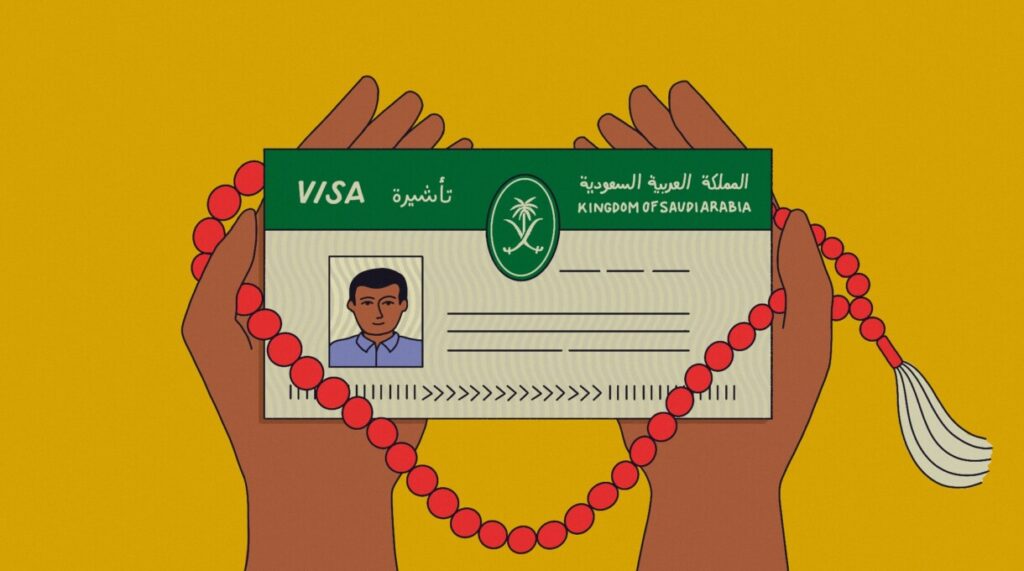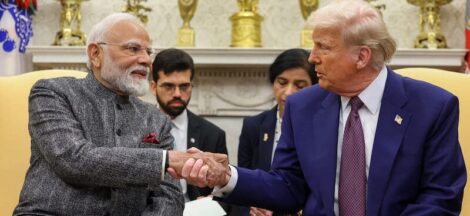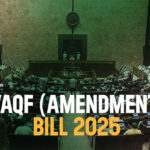By Tajul Islam
Saudi Arabia’s recent sweeping crackdown on immigration violations and a sudden tightening of visa regulations, particularly targeting 14 nations including Bangladesh, signals more than just internal security enforcement. Behind these actions lies a mounting strain in Saudi-Bangladesh relations-now further exacerbated by the controversial arrest of Bangladeshi actress and model Meghna Alam, reportedly at the informal behest of the Saudi ambassador.
Between April 3 and 9, Saudi authorities arrested 18,669 individuals for violating residency, labour, and border security laws. Among them, 11,813 were detained for breaching residency rules, 4,366 for violating border protocols, and 2,490 for labour law infractions. Additionally, 1,497 individuals were apprehended attempting to enter Saudi Arabia illegally, while 59 were caught trying to flee.
The Interior Ministry’s announcement of these mass arrests comes just as Saudi Arabia begins ramping up preparations for the 2025 Hajj season. Historically, the pilgrimage season attracts not only worshippers but also those looking to bypass labour restrictions and settle illegally under the cover of religious travel. This has led to overcrowding, logistical nightmares, and a persistent headache for Saudi authorities who aim to maintain tight control over migration during this critical period.
In a striking development, Saudi Arabia has temporarily suspended the issuance of Umrah, business, and family visas to citizens of 14 countries-including Bangladesh, India, Pakistan, Egypt, and Indonesia. The ban is expected to last until at least mid-June, with exceptions being made for those already issued Umrah visas before April 13.
The primary motive, according to Saudi officials, is the misuse of multiple-entry visas by foreigners who enter the Kingdom during Hajj and overstay illegally, often blending into the informal labour market. This influx not only violates immigration norms but disrupts labour market equilibrium and poses significant security risks.
However, this decision has raised alarm in Bangladesh, where over five million citizens work and live in Saudi Arabia. The timing and sweeping nature of the visa ban have triggered concerns that the move may not be merely administrative but politically charged-especially in light of recent developments involving a Saudi diplomat.
The arrest of Meghna Alam, a model and actress in Bangladesh, adds another layer of complexity to the already fragile relationship. On April 11, police confirmed her detention under the Special Powers Act, citing a complaint filed by Saudi Ambassador Essa bin Yusuf Al Duhailan. The ambassador, who recently completed his term in Dhaka, reportedly lodged an informal complaint to the Bangladeshi Foreign Ministry, claiming that Alam had attempted to extort him and had made threats.
Following this, the Home Ministry instructed police to investigate. When initial attempts to settle the matter through Alam’s family failed, the authorities opted for her arrest. The court has since approved her 30-day detention, and she is currently held at Kashimpur Central Jail.
In a Facebook post prior to her arrest, Meghna accused Ambassador Isa of orchestrating the abduction of individuals through the police and warned that the government was prepared to side with the diplomat against her. This claim, combined with her arrest under a broad and controversial law often criticized for enabling arbitrary detention, has sparked public outrage and raised questions about the influence of foreign diplomats over domestic legal procedures.
Additionally, another individual, Dewan Samir-reportedly an associate of Meghna – has been arrested in connection with the case. Diplomatic sources have acknowledged that the ambassador’s informal complaint was enough to trigger a chain of governmental action, raising concerns about sovereignty and due process. At a time when Saudi Arabia is tightening its visa policies and labour enforcement, this incident risks further souring relations.
Experts warn that Bangladesh must act quickly and diplomatically to manage the deteriorating situation. Failure to do so could have serious repercussions-not only in terms of the country’s international image but also for its economy, which is heavily reliant on remittances from workers in the Gulf region, particularly Saudi Arabia.
Adding further fuel to the fire was a recent protest in Dhaka on April 12, where participants in a ‘Palestine Solidarity Movement’ at Suhrawardy Udyan were seen carrying placards that not only condemned Israel and the United States but also included derogatory slogans against US President Donald Trump, Saudi Crown Prince Mohammed bin Salman and Indian Prime Minister Narendra Modi.
Footage of the event, which was organized by several Islamist-leaning political groups, has circulated globally and is being closely monitored by international media. The protest reflects the interim government’s shifting foreign policy, which many observers say has veered toward an anti-US, pro-Pakistan, anti-India posture in recent months.
This ideological alignment-combined with incendiary rhetoric against key regional players-risks isolating Bangladesh at a time when it can ill afford diplomatic friction. Saudi Arabia, a historically close ally and one of the largest sources of foreign remittances, may interpret these actions as a hostile turn, further complicating matters for the millions of Bangladeshis living and working there.
The convergence of the visa ban, the arrest of a public figure based on a diplomat’s complaint, and public protests targeting the Saudi monarchy indicates a rapidly deteriorating situation. The Bangladeshi government must tread carefully to repair ties with Riyadh, as any prolonged strain could endanger its labour exports, Hajj quota, and access to vital Gulf funding. (IPA Service)
By arrangement with the Arabian Post




 Centre Has Gone One Step Back But Set To Defend The Amended Waqf Act
Centre Has Gone One Step Back But Set To Defend The Amended Waqf Act 